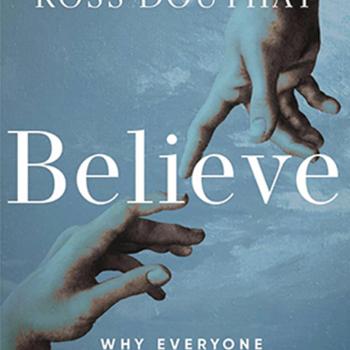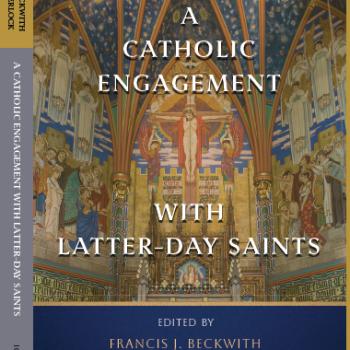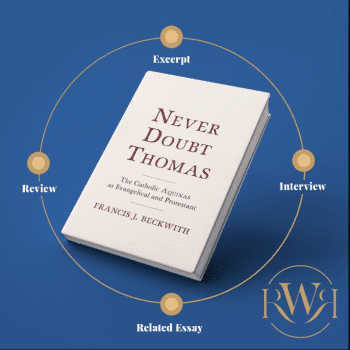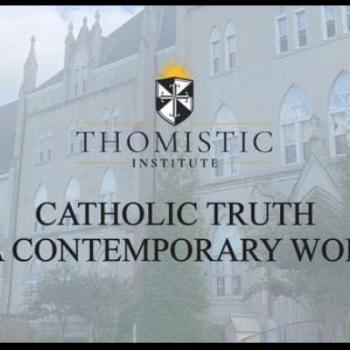I published this last year in Houston Baptist University’s periodical The City. My essay is one of two responses to Matthew Lee Anderson’s insightful piece, “The New Evangelical Scandal.” The other response was penned by my friend, John Mark Reynolds, Professor of Philosophy and Director of the Torrey Honors Program at Biola University. As you can probably tell, I had a lot of fun writing it. Here it is republished in toto.
Evangelical Catholicity
by Francis J. Beckwith
A self-ordained professor’s tongue, too serious to fool
Spouted out that liberty is just equality in school
“Equality,” I spoke the word, as if a wedding vow
Ah, but I was so much older then, I’m younger than that now.
Bob Dylan, “My Back Pages.” 1964
I need to make a confession. I am not entirely comfortable offering an assessment of an article with the title, “The New Evangelical Scandal.” It is not that I do not think I am qualified for the task. Rather, as the former president of the Evangelical Theological Society who resigned his post within days after returning to the Catholic Church of his youth, I suspect that some readers will think that I am more adept at scandalizing Evangelicals than providing them with any insights about Matthew Lee Anderson’s well-crafted essay. But that is a false dilemma. I am fully capable of accomplishing both in one sitting.
Nevertheless, I write with deep affection and appreciation for my Evangelical friends and what they have taught me over the years. I am convinced that if not for the Holy Spirit working through the many gifted and devoted Christian scholars and teachers in Evangelical Protestantism, some of whom I have had the privilege to know, love, and study under, my present faith would be significantly diminished. Their tenacious defense and practice of Christian orthodoxy is what has sustained and nourished so many of us who have found our way back to the Church of our youth. Thus, for me, as well as for many other Catholics, a diminished or theologically heterodox Evangelicalism that strikes at the movement’s catholicity is bad for Christianity. For it is that catholicity that kept many of us spiritually afloat when we—in our desire to follow Jesus—drifted from Rome but not from Christ.
What I mean by Evangelicalism’s catholicity is its traditional allegiance to classical Christian orthodoxy and all that it entails about the good, the true, and the beautiful, including its commitment to the authority of Scripture and the veracity and normativity of the Catholic creeds. This is why if Evangelicalism is to survive, it has to grow up and not “emerge.” It needs the wisdom of David Wells’s The Courage to Be Protestant rather than the beatnik aphorisms of Donald Miller’s Oprah-fied narrative, Blue Like Jazz. It needs more Augustine and less Pelagius, and a theological and pastoral leadership that understands that it is not above its pay grade to suggest to its people that a purpose-driven life requires a purpose-driven death.
Not surprisingly, Anderson persuasively argues that the stature of theology has declined among the young evangelicals. But I do not think that this means that the “new evangelical scandal” is the result of young evangelicals abandoning the great creeds of Christendom or even biblical inerrancy because they have thought deeply and carefully about these issues and have just come to conclusions inconsistent with what their predecessors believed.
Trust me, I wish it were that intellectually interesting. But it is just not that deep. Let’s concentrate on what I like to call “Starbucks Gnosticism” or “Goth Chick Authenticity.” Although he does not use either phrase, Anderson describes the phenomenon this way:
For young evangelicals, authenticity is synonymous with struggle…. The language of character formation, virtue, right and wrong has been supplanted by pseudo-psychological language about authenticity and feelings. With respect to decision-making and evaluation, the rightness or wrongness of an action or an attitude is downplayed if the action itself is “authentic.” When it comes to political decisions, policy, character, and experience take a back seat to whether the politician strikes us as a “real person.”
This call for authenticity and to be a “real person” comes from the same people whose population dominates Facebook, Twitter, and the blogosphere, who acquire their “information” from online bulletin boards and leftist news sites, and who often find themselves texting friends while driving down the freeway at 75 miles per hour. They clamor for truth, beauty, and goodness while looking on Wikipedia for a tattoo pattern that includes the question in calligraphy: “Who are you to judge?” If anything, they are the most image-hypnotized, and thus easily manipulated, generation in American history. This is why their idea of “authenticity,” unbeknownst to them, is itself another commodity they feel compelled to purchase from the manufacturers of the consumer culture they so often condemn for being “inauthentic.” They do not even realize that the reason why they bought Blue Like Jazz is because some marketer knew how to target them with the intellectual equivalent of sitcom one-liners combined with cool images and cutting-edge profanity. In an age of irony, that’s about as good as it gets. It’s as if Jack Nicholson were channeling Richard Rorty.
According to Anderson, the young evangelicals are questioners: “For previous generations of evangelicals, questioning one’s faith was anathema. Now, it is a rite of passage, necessary for maturation and perfectly acceptable to God. It is, after all, part of the journey toward authentic faith.” As a philosophy professor, I love questions and questioners. I encourage my students to think critically about their faith. Jesus himself was the master questioner, always asking just the right question to the right people at just the right time. But the young evangelicals are selective, self-serving, questioners, just like their Baby Boomer grandparents. They have bumper stickers on their car saying “Keep your rosaries off my ovaries” and “Question Authority,” while not realizing that the truth of the first requires that you not question the driver’s authority. So, what the bumper should have is just one sticker that asserts, “Question everyone’s authority except mine.”
The young evangelicals are a lot like that. They like to “share their feelings” about how they believe they are constrained by what Anderson calls, “puritanical legalism,” because “Jesus really cares about the heart and our intentions.” But they are, at the same time, absolutely certain about lots of other things that they would never dream of questioning, such as “social justice” and environmental sustainability. Thus, they “know” precisely in what bin each piece of garbage should be deposited (you dare not show contempt for God’s creation), but they feel it is “judgmental” for one Christian to tell another Christian that it is wrong to have sex with one’s boyfriend or girlfriend regardless of the genders of the participants. Thus, they are dogmatists, “puritanical legalists,” about the proper end of garbage and recycling, but “thoughtful questioners” about the proper end of their reproductive organs within the confines of the one-flesh communion of husband and wife. This is, of course, exactly the direction in which secular culture is heading, about which the young evangelicals refuse to take a “skeptical, authentic, thoughtful” pose they claim their parents’ generation lacked. The acorn does not fall far from the oak tree after all. Sorry to say, but if your worldview has more in common with Al Gore than Thomas Aquinas, you are not a “questioner.”
If the young evangelicals are really serious about “struggle” and “authenticity,” they should ignore drama queens like Donald Miller and look to those who have actually lived it. Take, for example, my late grandmother, Frances Guido (1913-2002). She lost her husband (my grandfather) to stomach cancer in 1952. Widowed at the age of thirty-eight, she worked as a seamstress and provided each of her four children with twelve years of Catholic-school education.
I once asked my grandmother why she never remarried. Her answer initially seemed stunning to me, though, given her beliefs and convictions, it made perfect sense. She said, “How can I bring a strange man into a home with two young daughters?” What an amazing (and politically incorrect) answer. Her first thought was not of herself and what she should have wanted. It was about what advanced the common good, and in this case, the good of her family and her young children. What my grandmother’s understanding manifested was the incarnational faith of which Jesus spoke when he told his disciples that “whoever would save his life will lose it; and whoever loses his life for my sake and the gospel’s will save it” (Mark 8:35). If you want to be an authentic real person, put down your iPod and pick up your cross.
You might say that I have been a little rough on the young evangelicals. But that is a lot less painful than the initial throbbing one feels immediately after the Goth Chick’s boyfriend impales your tongue with the metal stud you paid him to implant so that you can announce to the coffee shop set your individual authenticity, just like everyone else. So, I write these things for the sake of being authentic to my own narrative. And I know that the young people will understand.












